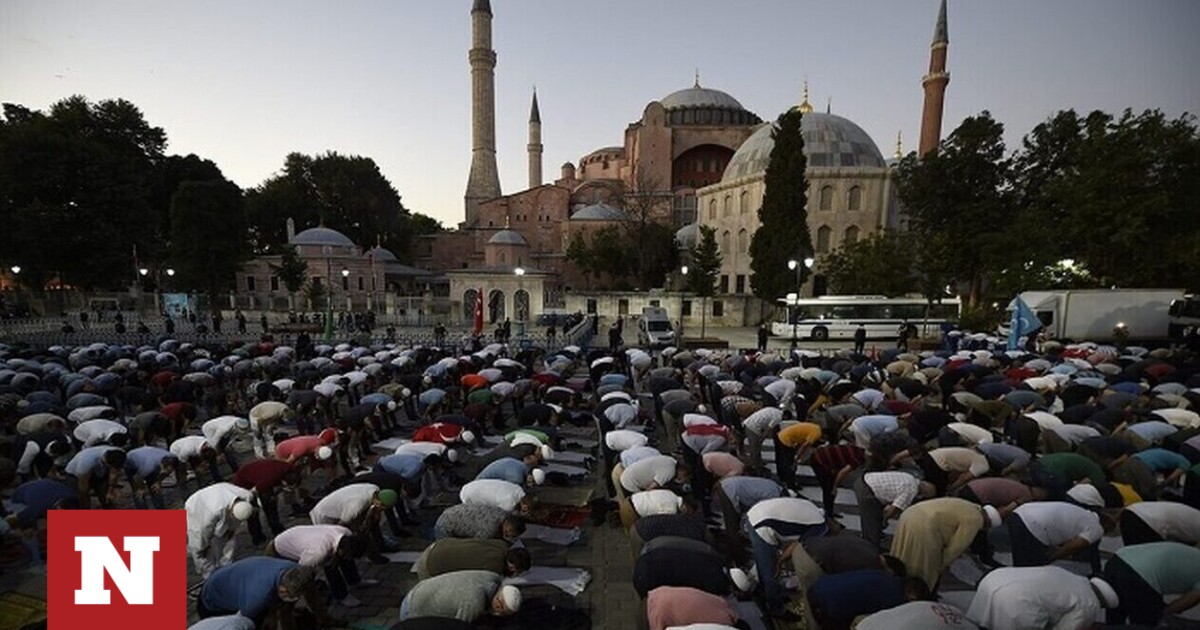
“It must be closed and restored. If it is not closed, it will collapse,” stresses Turkish historian Elber Ortayli regarding Hagia Sophia.
If the temple is not closed, It will collapse A prominent Turkish historian and academic warns against Hagia Sophia, stating that such a large number of visitors should not be allowed inside.
Turkish press reports refer to historian Eber Ortelli’s statements about Hagia Sophia, on a television program, where he continued his article about the damage and the number of visitors to the temple required.
“Can a large number of people be allowed into a 1,500-year-old building? What if it is not closed? The professor asked answeringly: “Of course it cannot be allowed in. That is why it must be closed and restored. Permanent restoration. If they are smart, they will close it. If it is not closed it will collapse», Elber Ortayli said.
In an article published by Hurriyet newspaper on September 17, the historian expressed concern about the damage to the monument since its conversion into a mosque, suggesting on the one hand that Hagia Sophia should be closed for a while. In order to carry out restoration work, on the other hand, the entry of three million pilgrims into the temple annually, in addition to the number of tourists, is considered disastrous.
According to what was reported by ERT, the professor talks about urgent intervention in the number of visitors, noting: “Hagia Sophia is not a path through which everyone can pass lightly, as the underground buildings, constructions that ensure the flow of water, waste, humidity and the ventilation system are not very resistant in the presence of a lot of visitors and need to be repaired, cleaned and restored urgently. It is a continuous process related to In the building itself
According to the professor, even the number of 20-30 thousand people annually, including scholars, historians, archaeologists, representatives of the Islamic religion, politicians and public servants, can be considered excessive in relation to the durability of the monument.
The professor also criticizes the interventions related to operating the monument as a mosque, noting: “Toilets and fountains related to the daily needs of the mosque cannot be installed in Hagia Sophia. Places that distribute water such as large fountains cannot exist. The water consumed and flowing from the classical Ottoman fountain and toilets today is not the same. Hagia Sophia has been around for 1,500 years. It is not reasonable Using Hagia Sophia’s toilets to defecate If every visitor uses the water fountains and toilets, how will the sewage system hold up under this building?
According to Turkish Minister of Tourism and Culture Mehmet Nuri Ersoy, Hagia Sophia has received 21 million visitors since it was converted into a mosque three years ago. Two months ago, the Turkish Minister announced projects to enhance the stability of Hagia Sophia, within the framework of restoring important historical monuments in Istanbul.
According to what was reported by ERT, according to the restoration plan approved by the relevant committee, the cement mortar will first be cleaned, the old lead on the surfaces of the dome will be removed, and work will be carried out to restore the cracks and crevices at the bottom of the dome. The lead cap will then be repaired and replaced. The first minaret, called the Bayezid Minaret, will also be dismantled and returned to its place once the repairs are completed. In other minarets, their static state continues to be studied.
the Elber Ortelli He is an honorary member of the Turkish Historical Society, a member of the Board of Directors of the International Committee for Ottoman Studies, a member of the European-Iranian Society and the Austrian-Turkish Scientific Forum, an advisor to the Ministry of Culture and Tourism, and former director of the Topkapi Museum.

“Hipster-friendly coffee fanatic. Subtly charming bacon advocate. Friend of animals everywhere.”





More Stories
F-16 crashes in Ukraine – pilot dies due to his own error
Namibia plans to kill more than 700 wild animals to feed starving population
Endurance test for EU-Turkey relations and Ankara with Greece and Cyprus